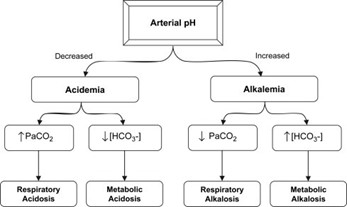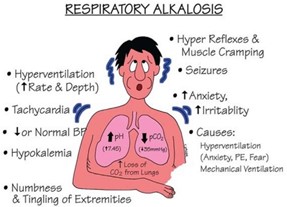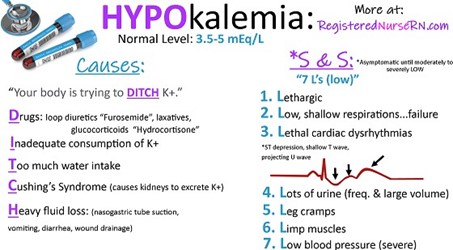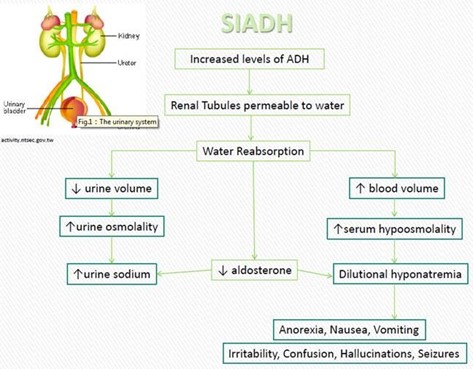A client comes to the emergency department with Asthma. Based on the documentation noted below, the nurse suspects that the client has what abnormality?
10/1/2022 at 18:30
Client wheezing, RR44, BP 140/90, HR 104, T 98.4 F, ABG results show pH 7.52 mmHg, HCO3-26, PaO2 90 mmHg C. Wynn RN
Respiratory acidosis
Respiratory alkalosis
Metabolic alkalosis
Metabolic acidosis
The Correct Answer is B
Based on the given documentation, the nurse suspects that the client has respiratory alkalosis. The client's ABG results show a pH of 7.52, which indicates alkalosis and the PaO2 level is slightly low, suggesting respiratory involvement. Rapid breathing (RR44) and wheezing also support the possibility of respiratory alkalosis.


Nursing Test Bank
Naxlex Comprehensive Predictor Exams
Related Questions
Correct Answer is B
Explanation
Furosemide is a loop diuretic that works by blocking the reabsorption of sodium and chloride in the ascending loop of Henle in the kidney, leading to increased urine output. However, this medication can also cause potassium loss through increased urinary excretion, which can lead to hypokalemia (low potassium level). Hypokalemia can cause confusion, weakness, and other neurological symptoms.
The normal range for serum potassium is 3.5 to 5.0 mEq/L. A potassium level of 2.9 mEq/L is below the normal range and is considered hypokalemic. Therefore, the nurse should correlate the client's confusion with the low potassium level and notify the healthcare provider to adjust the medication or provide potassium supplements if indicated.


Correct Answer is C
Explanation
The correct answer is c. I will eat foods high in potassium because the diuretics cause potassium loss.
Rationale for Choice A:
- Statement:"I should weigh myself daily and report any sudden weight loss or gain."
- Rationale:This statement is correct.It's crucial for patients with SIADH to monitor their weight daily as even slight fluctuations can signal fluid imbalances.Sudden weight gain can indicate fluid retention,while sudden weight loss might suggest dehydration.Both scenarios warrant medical attention.
Rationale for Choice B:
- Statement:"I need to limit my fluid intake to no more than 1 quart of liquids a day."
- Rationale:This statement is also correct.Fluid restriction is a cornerstone of SIADH management.By limiting fluid intake,patients can help prevent the buildup of excess fluid in the body,which can lead to complications such as hyponatremia (low sodium levels in the blood) and edema.
Rationale for Choice C:
- Statement:"I will eat foods high in potassium because the diuretics cause potassium loss."
- Rationale:This statement is incorrect.While some diuretics used in the treatment of SIADH can indeed cause potassium loss,this is not a universal side effect.Furthermore,increasing potassium intake without medical supervision can be dangerous,potentially leading to hyperkalemia (high potassium levels in the blood).It's essential for patients to consult with their healthcare providers for individualized guidance on potassium intake.
Rationale for Choice D:
- Statement:"I need to shop for foods that are low in sodium and avoid adding salt to foods."
- Rationale:This statement is correct.A low-sodium diet is often recommended for patients with SIADH to help manage fluid balance and prevent hyponatremia.Restricting sodium intake can reduce fluid retention and help maintain appropriate sodium levels in the blood.

Whether you are a student looking to ace your exams or a practicing nurse seeking to enhance your expertise , our nursing education contents will empower you with the confidence and competence to make a difference in the lives of patients and become a respected leader in the healthcare field.
Visit Naxlex, invest in your future and unlock endless possibilities with our unparalleled nursing education contents today
Report Wrong Answer on the Current Question
Do you disagree with the answer? If yes, what is your expected answer? Explain.
Kindly be descriptive with the issue you are facing.
